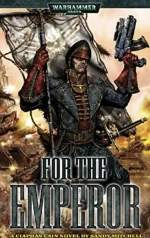
After being pleasantly surprised as I was with the quality of the writing in the top rated Warhammer 40,000 series, I decided to dive back in with what many say is the best series of the bunch, the Ciaphas Cain series.
I've completed the Gaunt's Ghosts series, all of the Eisenhorn series (that's been released) and a good deal of the Horus Heresy stuff, and while this series is fun, I don't think it really stacks up.
It's very well written, has all the earmarks of a good action Sci-Fi series, but I don't think I really am buying into the character of Ciaphas Cain.
The first book drops you, in media res, into the career of Ciaphus Cain, the most decorated Commissar in the military. So decorated that he is dubbed "The Hero of the Empirium".
The stories of his exploits are told as memoire written by Cain in his retirement where is is essentially coming clean about how he is no hero. All of his greatest victories are accidents that resulted from mostly just sacrificing his own soldiers to save his hide. He's a callous self absorbed womanizer.
So far it sets itself up to be a rather fun angle for a novel. It gave me BLACKADDER vibes from the start, complete with his own slovenly side kick (Baldric for BLACKADDER, Yurgin for CAIN), but I guess what turns me off a bit is that it's not BLACKADDER enough. Cain is, it turns out extremely competent and a preternatural swordsman and tactician, so while he often excuses his own successes as a unintentional biproduct of his own cowardice, in the end it comes off more s a humble brag to down play physical and mental feats that far exceed the average soldier.
The added level of novelty in the series is that there are several meta narratives to the book series as it is shot through with editorial notes by an Inquisitor named Amberley Vail who was Cain's romantic interest on and off for what seems like a long time (Cain, at the time of writing his memoirs was maybe 200 years old?) , who adds her own commentary, and outside excerpts of other books to add color to Cain's self serving memoir. These can be rather funny because there is another woman in Cain's life, Col. Regina Kasteen, who herself went on to attain the role of General and wrote her own memoirs. It's funny because Vail includes these excerpts while it's clear she doesn't much like Kasteen or her writing style.
Anyway, it's a very interesting series so far and I'll keep reading it, and the format is certainly interesting, but Cain's "inadvertant heroics as a side effect of cowardice" schtick is getting a bit old.

